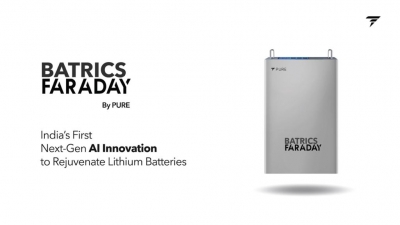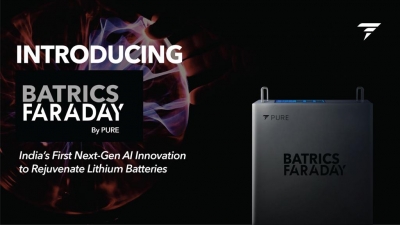 Hyderabad, Jan 4 : Pure EV, the electric vehicle vertical of Indian Institute of Technology – Hyderabad (IIT-H) incubated city startup Purenergy, has developed BaTrics Faraday, an artificial intelligence (AI)-based hardware which can automatically identify and repair defects in Lithium Ion (Li-Ion) batteries of electric vehicles.
Hyderabad, Jan 4 : Pure EV, the electric vehicle vertical of Indian Institute of Technology – Hyderabad (IIT-H) incubated city startup Purenergy, has developed BaTrics Faraday, an artificial intelligence (AI)-based hardware which can automatically identify and repair defects in Lithium Ion (Li-Ion) batteries of electric vehicles.
BaTrics Faraday obviates the need for a customer to visit service centres to fix their defective batteries.
“Pure EV has developed AI-driven hardware which carries out the diagnosis and resolution of defects in the battery through an externally-connected device to the battery. This saves precious man-hours otherwise spent in replacement of series of cells and significantly reduces the battery ‘Turn Around Time’ (TAT),” said Pure EV founder and professor Nishanth Dongari.
He said Li-Ion batteries are the most critical components of electric vehicles which have lithium cells welded together in series and parallel arrangements to meet the desired voltage and ampere hour capacity.
“In case of any defects coming to batteries in any of the cell series, it leads to significant downtime to the EV owners. Additionally, the usage behaviour pattern and Indian environmental conditions put more load on the batteries,” said Dongari
He highlighted that it is a very difficult task for battery original equipment manufacturers (OEMs) to get defects rectified through diagnosis and replacement of defective series of cells, where he pitches BaTrics Faraday.
According to the startup, electric vehicle owners depend on EV OEMs who in turn look up to battery OEMs for issues with batteries, making it a challenge to repair as supply chains are not yet well established.
“This intelligent device enhances the capability of Pure EV to turn around battery defects within a shorter time period. With the significant takeoff happening for EVs, PURE EV is building the necessary infrastructure and technical capabilities to become a pioneer in battery after sales service for its esteemed customers,” said Pure EV chief executive Rohit Vadera.
The startup said the AI repair technology, which can applied on all its five two-wheeler models has been tested extensively, and ready for launch in the first quarter of 2021.
Disclaimer: This story is auto-generated from IANS service.







